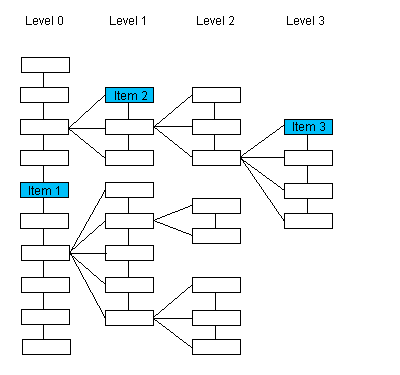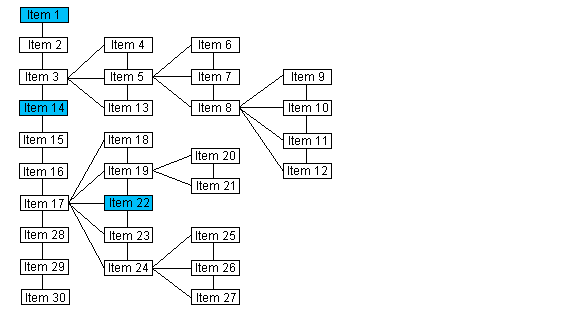LDicomDS::FindFirstKey
#include "ltdic.h"
pDICOMELEMENT LDicomDS::FindFirstKey(pElement, pszKey, bTree)
Returns a pointer to the first item in the Dicom Dir Data Set with the specified key element type.
Parameters
pDICOMELEMENT pElement
Pointer to a DICOMELEMENT structure within the Data Set.
L_TCHAR * pszKey
Character string that contains the type of key element to find. Possible values are:
| Value | Meaning |
|---|---|
| "PATIENT" | Patient key element |
| "STUDY" | Study key element |
| "SERIES" | Series key element |
| "IMAGE" | Image key element |
| "OVERLAY" | Overlay key element |
| "MODALITY LUT" | Modality-LUT key element |
| "VOI LUT" | VOI-LUT key element |
| "CURVE" | Curve key element |
| "STORED PRINT" | Stored print key element |
| "RT DOSE" | RT dose key element |
| "RT STRUCTURE SET" | RT structure set key element |
| "RT PLAN" | RT plan key element |
| "RT TREAT RECORD" | RT treatment record key element |
| "TOPIC" | Topic key element |
| "VISIT" | Visit key element |
| "RESULTS" | Results key element |
| "INTERPRETATION" | Interpretation key element |
| "STUDY COMPONENT" | Study Component key element |
| "PRESENTATION" | Presentation key element |
| "WAVEFORM" | Waveform key element |
| "SR DOCUMENT" | Structured Reporting Document key element |
| "PRIVATE" | Private key element |
| "KEY OBJECT DOC" | Key Object Document key element |
| "SPECTROSCOPY" | Spectroscopy key element |
| "RAW DATA" | Raw Data key element |
| "REGISTRATION" | Registration key element |
| "FIDUCIAL" | Fiducial key element |
| "HANGING PROTOCOL" | Hanging key element |
| "ENCAP DOC" | Encapsulated Document key element |
| "HL7 STRUC DOC" | HL7 Structured Document key element |
| "VALUE MAP" | Real World Value Mapping key element |
| "STEREOMETRIC" | Stereometric Relationship key element |
L_BOOL bTree
Flag that indicates how the Data Set will be evaluated. Possible values are:
| Value | Meaning |
|---|---|
| TRUE | Evaluate the Data Set as a tree. |
| FALSE | Evaluate the Data Set as a list. |
Returns
| Value | Meaning |
|---|---|
| !NULL | A pointer to a DICOMELEMENT structure that contains the first item in the Data Set with the specified key element type. |
| NULL | An item with the specified key element type was not found. |
Comments
If the Data Set is evaluated as a tree structure, this function returns the first item on the same level as pElement with the same parent as pElement, that has key element type pszKey.
For the sake of these illustrations, the order of siblings is top to bottom. Therefore first is evaluated top to bottom.
NOTE: The numbering of the items of interest in this first illustration is arbitrary and does not imply order.

| If the passed pointer points to: | The function returns a pointer to: |
|---|---|
| Item 1 | The first sibling (same level, same parent) of Item 1 that has the key element type pszKey, if such an item exists. If such an item does not exist, the function returns NULL. |
| Item 2 | The first sibling (same level, same parent) of Item 2 that has key element type pszKey, if such an item exists. If such an item does not exist, the function returns NULL. |
| Item 3 | The first sibling (same level, same parent) of Item 3 that has key element type pszKey, if such an item exists. If such an item does not exist, the function returns NULL. |
If the Data Set is evaluated as a list, this function returns the first item in the entire list that has key element type pszKey. The search begins at the top of the list.
For the sake of these illustrations, the order of siblings is top to bottom. Therefore first is evaluated top to bottom.
NOTE: The numbering of the items in this illustration does indicate the order of the items when the Data Set is evaluated as a list.

| If the passed pointer points to: | The function returns a pointer to: |
|---|---|
| Item 1 | The first item in the list that has key element type pszKey, if such an item exists. Searching begins at the top of the list. If an item with key element type pszKey is not found, NULL is returned. |
| Item 14 | The first item in the list that has key element type pszKey, if such an item exists. Searching begins at the top of the list. If an item with key element type pszKey is not found, NULL is returned. |
| Item 22 | The first item in the list that has key element type pszKey, if such an item exists. Searching begins at the top of the list. If an item with key element type pszKey is not found, NULL is returned. |
The following functions will also help you find elements in the Data Set with a specific key element type:
Required DLLs and Libraries
- LTDIC
- For a listing of the exact DLLs and Libraries needed, based on the toolkit version, refer to Files To Be Included With Your Application
Win32, x64
Functions
Topics
- Working with Basic Directory Key Elements
- How to Disable the Automatic Loading of the default DICOM IOD Table
Example
For an example, refer to LDicomDS::InsertKey.
© 1991-2020 Apryse Sofware Corp. All Rights Reserved.
